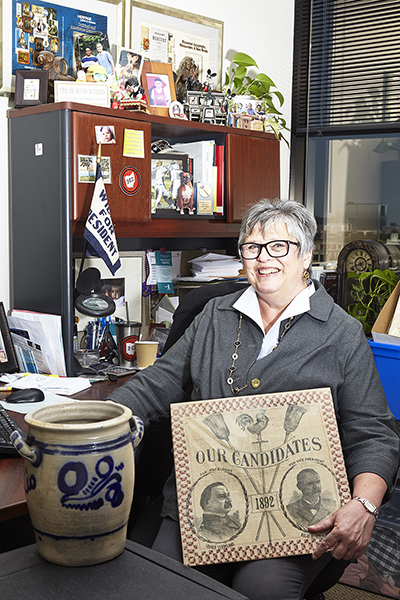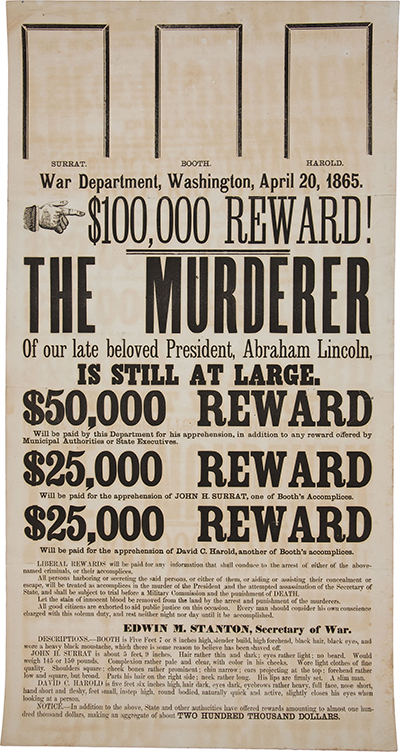Consignment director at Heritage Auctions, Marsha Dixey has worked in the Americana historical and collectibles business as a dealer/collector since 1978. She is a widely acknowledged expert generalist, handling almost anything falling under the “Americana” umbrella. Her interest in American social history has made her an expert in women’s suffrage items and African Americana. Dixey has dealt in premium antique advertising for years and served two years on the board of directors for the Antiques Advertising Association of America. Prior to coming to work for Heritage, she worked with Tom Slater at Slater’s Provenance Auctions in Indianapolis, Ind. Their success in auctioning Americana and sports collectibles became the foundation of Heritage Auctions’ historical department, which they started in 2005.

Marsha Dixey in her native habitat. Notice her nest is composed of a variety of materials, such as more work than she can handle, gifts from family and friends, and several nice pieces of Americana.
Tell me about yourself and what was your journey to becoming consignment director at Heritage Auctions?
I started in the business of buying and selling antiques in the late 70s. Through the next 30 years I worked in the business doing shows and working for local auctioneers. It was in 2002 when my friend and colleague Tom Slater, who owned Slater’s Provenance Auctions at that time, convinced me to come and work for him in Indianapolis. We produced auctions selling all types of collectibles from political Americana to sports memorabilia and everything in between. After three successful years of two or three auctions a year, Heritage approached us about joining them. We made the decision to move from Indy to Dallas and became the foundation for Heritage Auctions’ historical department.
Do you have a personal collection?
I have a small collection of antique advertising. I love the color and detail involved in early lithography and the advertisements, in my opinion, show a slice of how we lived in those days.
What is your role at Heritage?
I wear many hats here — which keeps me on my toes. I am the senior Americana generalist, which means I appraise and evaluate everything from historical objects to collectibles and American pop culture. As we have grown and expanded into manuscripts, books, space, Western Americana and arms and armor, my responsibilities have included the production of about 24 catalogs a year as well as driving a great deal of our advertising in antiques periodicals.
Did having roots in the South impact your areas of expertise and interest?
Most summers were spent with my grandparents who lived in Richmond, Va., where I was immersed in family history as well as the early settling of Virginia. I think my firsthand indoctrination into historic places like Williamsburg, Yorktown and Jamestown, as well as side trips to museums, certainly fueled my passion for American history and collecting. I developed a specific interest in the Civil War. I think this was in part due to my grandfather dragging me around to different battlefields, like Seven Pines, Oak Grove and, once, all the way to Hampton Roads. We would walk the fields particularly at Seven Pines, sometimes finding artifacts but mostly looking at maps of troop movements. I’m not sure I really understood at the time, but I was hooked.

Marsha Dixey noticed something folded inside a Civil War ledger she was appraising. “At the top I could see the word ‘MURDERER’ and as I unfolded what appeared to be a printed broadside, I knew exactly what we had found: tucked inside the ledger was a third printing of a John Wilkes Booth assassination broadside in immaculate condition!” The broadside went to auction and sold on May 21, 2011, for $47,800.
What special item have you brought to market?
This is what I find is fun about working for Heritage Auctions. People bring in the most interesting items. I was working with a client on things that had been passed through her family from her great-great-grandfather who had been a Union soldier during the Civil War. At some point he had been placed in charge of a captured Confederate quartermaster’s post — he was to clean it up so it could be used. As he was doing so he collected bits of miscellaneous autographs, orders and notes from the previous tenant and pasted them in a ledger book. The ledger had many wonderful autographs but as we turned the pages I noticed something larger folded inside. At the top I could see the word “MURDERER” and as I unfolded what appeared to be a printed broadside, I knew exactly what we had found: tucked inside the ledger was a third printing of a John Wilkes Booth assassination broadside in immaculate condition! The client had no idea it was even there although she had looked at the book often. Later the item sold for about $40,000 at auction.
What is on the horizon for you, and for Heritage, if you can speak for your company?
For anyone in this business, dealer or auction house, I believe we must get on the technical bandwagon if we are going to serve the needs of the future collecting community. At Heritage we have seen the old model of auction disappearing. Auction rooms that used to be filled to capacity with people have turned into a small stage to present the auction through the Internet. The Internet format allows millions more to participate. Future collectors will want to buy for their collections through a format that is familiar to them and convenient and live Internet auctions certainly provide that. I am fascinated to be working in this environment of change for a company that is on the cutting-edge.

